The Quietly Devastating Truth of Elvis’s Marriage
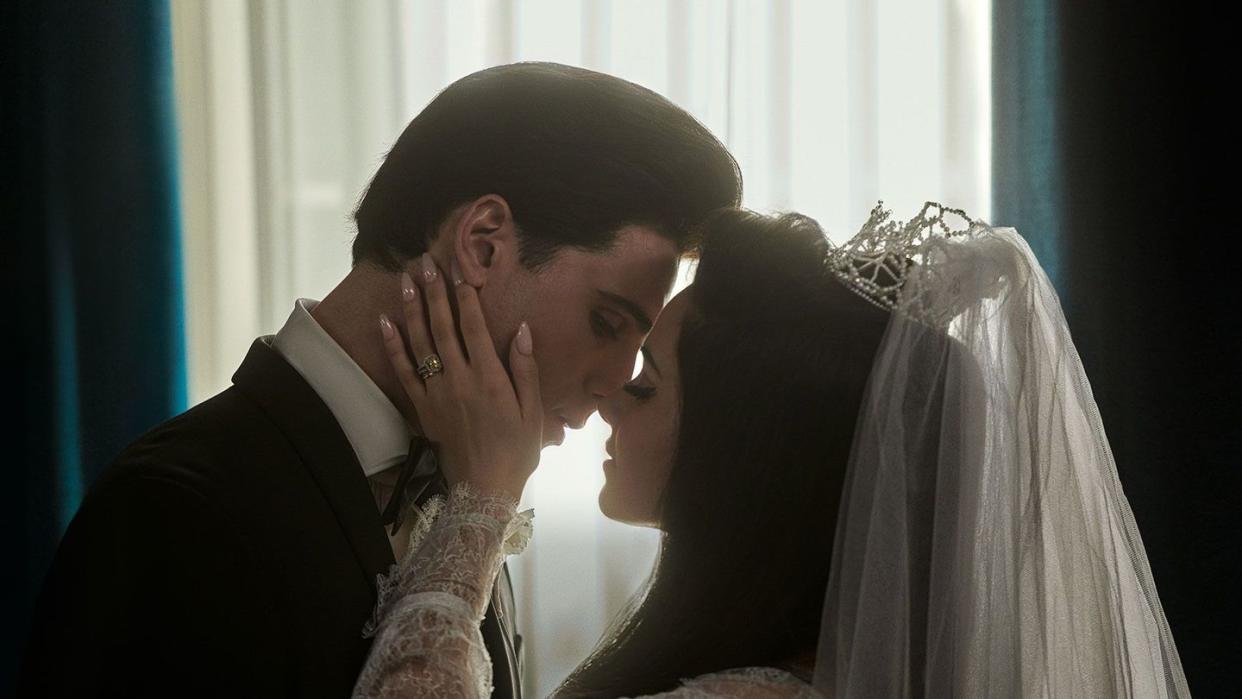
- Oops!Something went wrong.Please try again later.
- Oops!Something went wrong.Please try again later.
- Oops!Something went wrong.Please try again later.
- Oops!Something went wrong.Please try again later.
"Hearst Magazines and Yahoo may earn commission or revenue on some items through these links."
IF ADS FOR the new movie Priscilla give you a sense of déjà vu, you're not alone. It was only last year that Elvis, the spectacle-driven biopic from director Baz Luhrmann, gave the King of Rock and Roll his biggest spotlight in decades. Now director Sofia Coppola (Lost in Translation, Marie Antoinette) has entered with what could be called a corrective, or at least a counterpoint, to that film’s glossy excesses: Her Priscilla (now playing in theaters across the country) is almost exclusively told from the point of view of his first and only wife.
Adapted from Priscilla Presley’s 1985 book Elvis and Me, Priscilla tends to focus on hushed conversations, with no arena set pieces (the company that owns the majority of Elvis’s assets denied music rights). Cailee Spaeny stars in the title role, while Jacob Elordi plays the hunky, magnetic, controlling, and extremely complicated superstar. The movie is already inviting renewed skepticism about the central relationship: Priscilla met Elvis when she was 14, and Elvis was 24 and already one of the most famous singers in the world. They started living together soon after, though it would be years before they married and had their only child, Lisa Marie Presley, who died earlier this year.
How did the courtship between Elvis and Priscilla, wildly inappropriate by today’s standards, actually unfold in those days? What kind of spin does Coppola give their tumultuous six-year marriage? And why does Priscilla still talk fondly of her ex? Here all your pressing Elvis-and-Priscilla questions, based on interviews and other writing and reporting about their romance, answered.
How did Elvis and Priscilla meet?
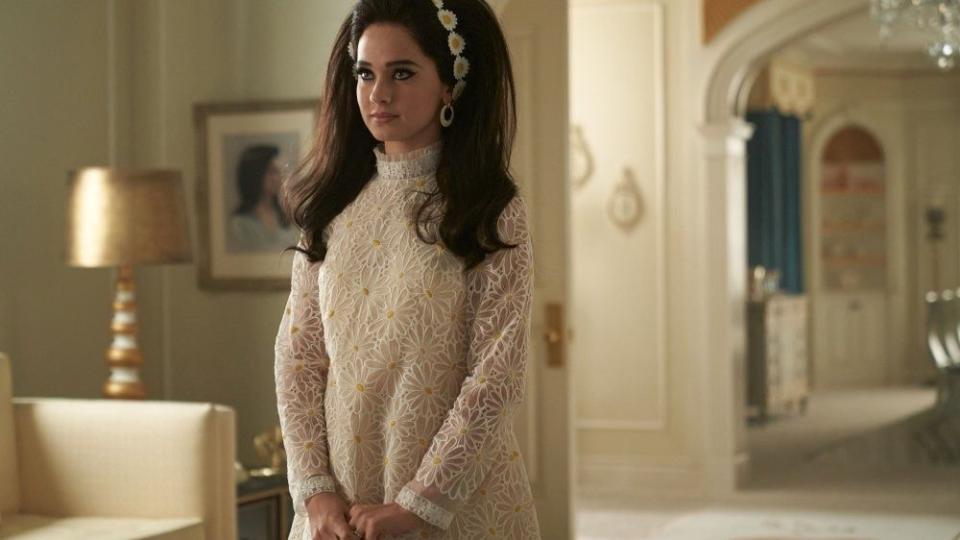
Elvis and Priscilla Presley (née Beauliu Wagner) met in the most unlikely of places: 1950s Germany. Specifically, Elvis was serving in the U.S. Army in Wiesbaden, West Germany, at the time, while Priscilla’s stepfather, who was in the Air Force, had been transferred to the base there. She already knew all about the musician, as she had listened to his first record at 11 years old, while her family was stationed at a base in Austin, Texas.
"Three years later and 5,500 miles away I would meet him," Priscilla wrote in an essay for People in 1985.
The couple reportedly first set eyes on each other at a party in 1959. While out with her brother, another service member had invited her to accompany him and his wife to meet Elvis. Her stepfather Paul, after talking to this man’s commanding officer, gave permission.
On the fateful November night, Priscilla entered Elvis’s home in Bad Nauheim, wearing a navy-and-white sailor dress. The “Hound Dog” performer was not put off when she informed him that she was in the ninth grade. She would recall that he responded, “Why, you’re just a baby.” Elvis dazzled his guests playing several songs, including “Are You Lonesome Tonight?”
“It started out really with his voice,” Priscilla told Today in 2017. “People loved his voice. When he sang, it was like he was singing to you.”
While it’s easy to look back at Elvis’s behavior as predatory, Priscilla even now remembers their courtship in warmer terms.
“It was a different time,” she recently told The Hollywood Reporter. “I lived in his world. I wanted to please him. I wanted to fit in. I wanted to have fun with him. I wanted to see what it was that he liked.”
So did they have sex while she was a minor?
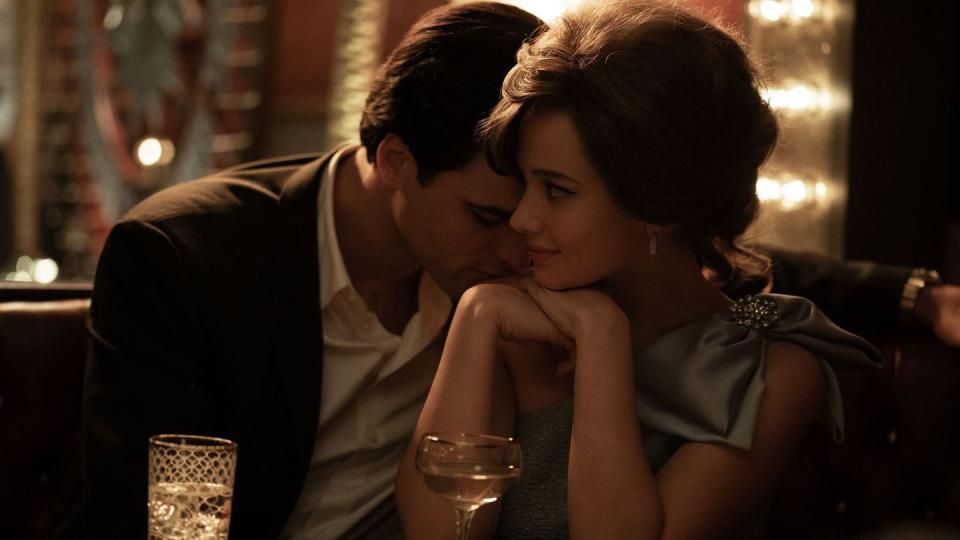
Priscilla is careful, like the woman it’s named for, to stipulate that Elvis did not try to engage in sex with her immediately, while she was still under 18. That doesn’t mean that their closeness was entirely platonic, as she tried to convince her parents when they became suspicious.
Indeed, from the first party scene, Coppola makes the dreamily romantic atmosphere clear. He kisses her that night. Coppola also emphasizes Elvis’s tightly-controlling nature throughout the movie. Pointedly, in their early dates among other people, he directs her to make her way to his bedroom, letting her know he will meet her there later. (When she’s dismayed at their lack of intimacy, he also drops the hint that they can do “other things” in bed.)
In real life, when Priscilla’s parents intervened after their fourth date, he smoothly found his way around that hurdle, too. "You have women throwing themselves at you. Why my daughter?” she remembered her dad asking. Elvis supposedly said, "I happen to be very fond of her. She’s a lot more mature than her age and I enjoy her company... You don’t have to worry about her, Captain. I’ll take good care of her.” (This conversation is repeated verbatim in Coppola’s movie.)
In fact, rather than being wary due to her age, Elvis seemed to consider Priscilla’s impressionability part of her appeal. He reportedly told a friend that she was “young enough that I can train her any way I want.”
But Elvis was also drawn to her for other reasons. He noticed a resemblance between Priscilla and his beloved mother Gladys, whose recent death he was grieving in 1959. “I saw him at a very vulnerable time in his life,” Priscilla recalled talking to Larry King in 1999.
In 1960, when Elvis returned to the U.S., Priscilla stopped hearing from him. But then he began calling once more. She quickly got swept back up. Though she had yet to graduate high school, in 1963, Priscilla finished her schooling in Memphis, Tennessee, where she lived by Elvis’s side, in his legendary mansion Graceland.
When did they get married, and how did the marriage unravel?
Priscilla did finally graduate high school, though she later admitted her studies “became a chore” compared to her glamorous Graceland lifestyle.
Elvis’s decisions largely dictated not just what she did, but also what she wore, listened to, even what she thought. He told her that he liked "soft-spoken brunettes with blue eyes," and made Priscilla in his image. She came to think of herself as “Elvis’s living doll, to fashion as he pleased.” Among other things, he directed her to dye her hair black to match his. In the movie, we literally watch him instruct her, “Blue is your color,” and at another point, “Prints do nothing for you, babe.” He also believed that the “right” girl, Priscilla has noted, was to be saved for marriage, and indeed in her telling, she was virginal until they got hitched.
Their wedding took place in Las Vegas in 1967, a year after he had proposed to her. The marriage was encouraged by Colonel Tom Parker, Elvis's manager (you might remember him as Tom Hanks under heavy prosthetics in Luhrmann’s Elvis). “At that time it wasn’t nice for people to live together," Priscilla explained to Ladies Home Journal in 1972.
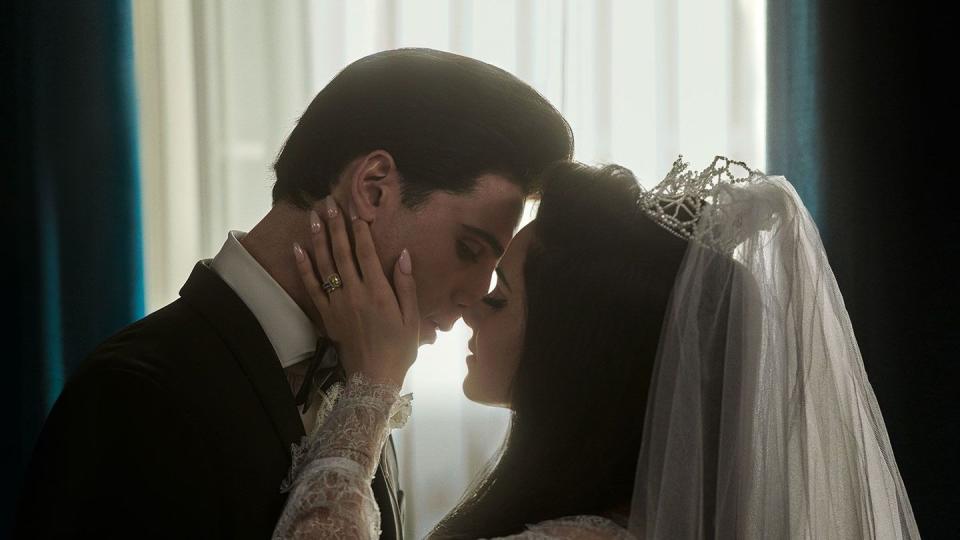
But it wasn’t long before the marriage turned into a kind of nightmare, as depicted in Priscilla. Elvis, who in his wife’s account was never faithful, demanded that they temporarily separate while she was still pregnant with their daughter Lisa Marie, because “he was going through some things.” Lisa Marie was born nine months after their wedding.
Priscilla’s indignities continued. Though the couple patched things up, Elvis reportedly refused to be intimate with Priscilla following the birth of their daughter. She wrote in her book that Elvis once told her “he had never been able to make love to a woman who had a child.”
"I [was] beginning to doubt my own sexuality as a woman," she wrote. "My physical and emotional needs were unfulfilled."
Elvis’s drug abuse had also long interfered in their life. While she was still in school, Elvis gave her pills he was taking to help her stay awake during the day, and more pills to help her fall asleep at night. In Coppola’s movie, as she’s adjusting to his always-on schedule, we see her start reaching for the pills herself.
But while the ending of Priscilla might leave one with the impression that Elvis’s medicated self-abasement was what ultimately broke their marriage, the main factor according to her was mutual infidelity, and a sense of a growing distance between them as she, well, got older and more autonomous.
“Not that he had someone special,” Priscilla said of his affairs on Australia’s Sunday Night in 2017, “but when you’re in the entertainment business there is always that and I tried to turn my back to that, but I just didn’t want to share him.” She also reportedly began her own dalliance with karate instructor Mike Stone in the early ‘70s, played by a delightfully hammy Evan Annisette in Priscilla.
More to the point, she found herself yearning to discover who she was outside of Elvis’s grip. During a 2016 appearance on Loose Women, Priscilla said, “You obviously didn’t have your own life. You lived his life.”
She went on that journey of self-discovery when she left the marriage (soundtracked by a choice Dolly Parton cut in Priscilla, as she drives out of Graceland’s gates). Yet even after their divorce was finalized in 1973, she didn’t stop loving him. Elvis and Priscilla remained friends and confidantes as they coparented Lisa Marie.
After hearing the news of Elvis’s death, at age 42 in 1977, Priscilla was shocked. “I wanted to die,” she wrote.
How does Priscilla frame their relationship?
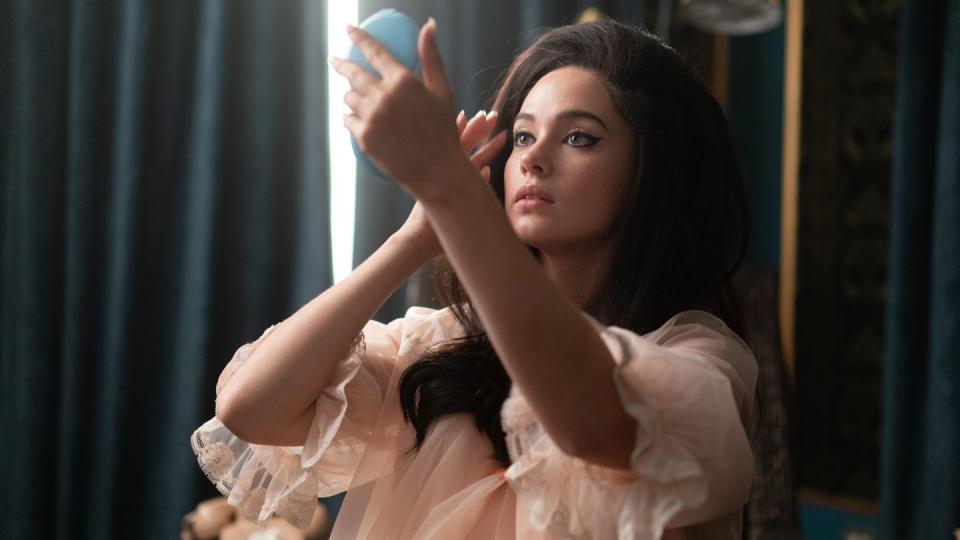
Coppola’s movie is faithful above all else to Priscilla Presley’s book and her quotes over the years, which only makes sense, given that Elvis died in the ‘70s far before his time and can hardly speak for himself.
But Priscilla also poignantly makes us aware of that limited perspective, beginning with the opening close-up shots of Priscilla applying false eyelashes and sinking her bare feet into pink carpeting (there is a lot of carpet in this movie). The sequence is gorgeously played to the playfully anachronistic 1980 Ramones cover of the Ronettes' 1963 “Baby, I Love You.” The overseas military teen is all boredom and pent-up potential, waiting to be awakened.
Cailee Spaeny is just as believable as an adolescent as a twentysomething jaded by fame’s consequences. Elordi is likewise great (though bound to be overshadowed by Austin Butler’s previous turn as the singer), with the two actors’ height differential accentuating the imbalance that constantly threatens the relationship. Elvis often storms into frame, either with seduction or a jarring menace, as when he throws a chair near Priscilla’s face after she dares to honestly answer his request for feedback about a song.
Coppola is meticulously attuned, as in all her work, to the feminine rituals that define her subject to the outside world, generally rendered in cake-like pastel hues: long hours Priscilla spends choosing a dress, doing makeup, or spent in the salon nailing down a look (there is also a lot of hairspray going on).
These superficial pleasures offer Priscilla amusement even as she’s stifled in her kept life. (“It’s me or career,” Elvis bluntly informs her over a phone call when she floats the idea of working part-time at a local boutique.) She stares out of Graceland’s windows, looking porcelain-perfect and also very, very sad.
Some realities get cut out of the plot: The fact that Paul was her stepfather, rather than her biological father, and her brother’s existence, are excised, presumably for time. But other tiny details, which will no doubt be debated by Elvis historians and fans, are potent with emotional payoff. In an early scene, as Priscilla is not only maturing but quickly fleeing the safe (if lame) confines of her family household to be with a rock star, her stepdad embraces her with both immense tenderness and silent excruciation at the development. The more Coppola closes in on those delicate but crucial moments, the more the director shows us without telling us the unfathomable heartbreak of Priscilla’s story.
You Might Also Like

